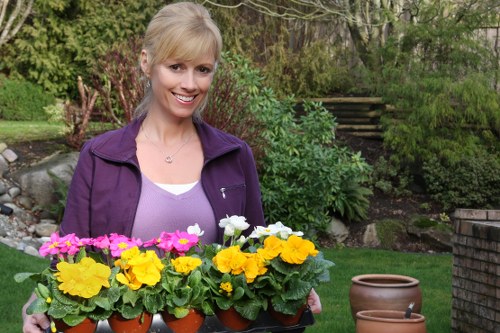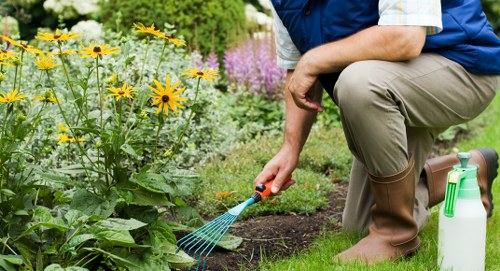Garden Maintenance in Whitechapel

Maintaining a beautiful garden in Whitechapel goes beyond mere aesthetics; it’s about creating a serene and inviting outdoor space that enhances your property's value and provides a tranquil retreat from the bustling city life. Whether you are a seasoned gardener or a novice, understanding the essentials of garden maintenance can make a significant difference in the health and appearance of your garden.
Whitechapel, with its unique climate and soil conditions, presents both challenges and opportunities for garden enthusiasts. The right maintenance practices tailored to this specific locale can ensure your garden thrives year-round. From selecting the appropriate plants to implementing effective watering and pruning techniques, every aspect plays a crucial role in garden upkeep.
In this comprehensive guide, we will explore various strategies and tips for effective garden maintenance in Whitechapel. Our goal is to equip you with the knowledge and tools necessary to cultivate a vibrant and sustainable garden that not only beautifies your home but also contributes positively to the local ecosystem.

Understanding the Local Climate
Whitechapel experiences a temperate maritime climate, characterized by mild winters and cool summers. This climate is conducive to a wide variety of plants, but it also requires specific maintenance approaches to address issues such as humidity, rainfall, and temperature fluctuations.
Temperature: The moderate temperatures in Whitechapel mean that extreme heat or cold is rare. However, gardeners should still be mindful of sudden weather changes that can affect plant health.
Rainfall: With ample rainfall throughout the year, proper drainage is essential to prevent waterlogged soil, which can lead to root rot and other plant diseases. Implementing effective drainage solutions can help maintain soil health and plant vitality.

Soil Preparation and Health
Healthy soil is the foundation of a thriving garden. In Whitechapel, the soil can vary from sandy loam to clay, each with its own set of maintenance requirements. Conducting a soil test is an important first step in understanding the composition and fertility of your garden soil.
Amendments: Based on the soil test results, you may need to add amendments such as compost, manure, or peat moss to improve soil structure and nutrient content. These additions enhance the soil's ability to retain moisture and provide essential nutrients to plants.
pH Levels: Maintaining the correct pH level is crucial for nutrient uptake in plants. Most garden plants prefer a slightly acidic to neutral pH range (6.0-7.0). If the pH is too high or too low, adjusting it with lime or sulfur can help create optimal growing conditions.

Plant Selection and Care
Choosing the right plants is paramount for a successful garden in Whitechapel. Opt for native species and those well-suited to the local climate and soil conditions, as they are more likely to thrive with minimal intervention.
Perennials vs. Annuals: Incorporating a mix of perennials and annuals can add both longevity and variety to your garden. Perennials offer enduring beauty and require less replanting, while annuals provide seasonal color and flexibility.
Succession Planting: To maintain continuous blooms and greenery, practice succession planting by staggering the planting times of different species. This technique ensures that your garden remains vibrant throughout the growing season.

Watering Techniques
Proper watering is essential for garden health, especially in areas with consistent rainfall like Whitechapel. However, overwatering can be just as detrimental as under-watering. Implementing efficient watering systems and practices can help maintain the right moisture levels.
Drip Irrigation: Installing a drip irrigation system ensures that water is delivered directly to the plant roots, minimizing evaporation and reducing water waste. This method is particularly effective for established plants and shrubs.
Mulching: Applying mulch around plants helps retain soil moisture, suppress weeds, and regulate soil temperature. Organic mulches, such as bark or straw, also decompose over time, enriching the soil with nutrients.

Pruning and Trimming
Regular pruning and trimming are vital for maintaining plant health and aesthetics. Proper cutting techniques encourage robust growth, prevent disease, and enhance the overall shape of your plants.
When to Prune: The best time to prune most plants in Whitechapel is during late winter or early spring before new growth begins. However, flowering plants may require specific pruning schedules to ensure optimal blooms.
Tools and Techniques: Using sharp, clean tools like pruning shears, loppers, and saws ensures clean cuts that heal quickly. Learning the correct techniques for each type of plant will prevent damage and promote healthy growth.

Weed Control
Weeds compete with your garden plants for nutrients, water, and light, making effective weed control essential for healthy garden maintenance. In Whitechapel, where rainfall can support rapid weed growth, proactive measures are necessary.
Mulching: As mentioned earlier, mulch not only retains moisture but also acts as a barrier against weed seeds. Regularly replenishing mulch can keep your garden beds weed-free.
Manual Removal: Hand-pulling weeds is an effective, albeit labor-intensive, method of control. It is best performed after a rainfall when weeds are easier to remove from the soil.

Pest and Disease Management
Pests and diseases can pose significant threats to garden health. Identifying and addressing these issues promptly can prevent extensive damage and maintain plant vitality.
Integrated Pest Management (IPM): IPM is a sustainable approach that combines biological, cultural, physical, and chemical tools to manage pests effectively while minimizing environmental impact.
Natural Remedies: Utilizing natural predators, such as ladybugs for aphid control, or organic sprays can reduce reliance on harmful chemicals and promote a healthier garden ecosystem.

Fertilization Strategies
Proper fertilization ensures that your plants receive the necessary nutrients for growth and flowering. In Whitechapel, where soil fertility can vary, tailored fertilization plans are essential.
Organic Fertilizers: Compost, manure, and bone meal are excellent sources of organic nutrients that improve soil structure and microbial activity, fostering a healthy root system.
Balanced Fertilizers: Using a balanced fertilizer with equal parts nitrogen, phosphorus, and potassium can support overall plant health. It's important to follow recommended application rates to avoid nutrient imbalances.

Seasonal Maintenance Tasks
Each season in Whitechapel brings unique challenges and opportunities for garden maintenance. Adapting your maintenance routine to the changing seasons ensures year-round garden health.
Spring: Focus on planting new blooms, pruning dead growth, and preparing garden beds for the growing season. This is also the time to implement pest control measures before they become problematic.
Summer: Maintain consistent watering, deadhead spent flowers, and manage weeds. Ensuring adequate shade and mulching can help plants cope with the warmer temperatures.

Winter Care
Winter poses its own set of challenges for garden maintenance in Whitechapel. Proper preparation can protect your plants and ensure they emerge healthy in the spring.
Protective Coverings: Using frost cloths, burlap, or other protective materials can shield sensitive plants from frost and heavy snowfall, preventing damage to stems and roots.
Pruning: Late fall is an ideal time for pruning dormant trees and shrubs. Removing dead or diseased branches reduces the risk of winter damage and encourages healthy growth in the spring.

Lawn Care
A well-maintained lawn is a cornerstone of any beautiful garden. In Whitechapel, lawn care involves specific practices to keep it lush and green throughout the year.
Mowing: Regular mowing at the appropriate height promotes dense grass growth and prevents weeds from taking hold. It's recommended to mow frequently during the growing season and adjust the height based on grass type.
Feeding: Applying a balanced lawn fertilizer in the spring and fall provides essential nutrients that support root development and grass resilience against stressors.

Garden Design and Layout
Thoughtful garden design enhances both functionality and aesthetics. Planning the layout based on plant types, sunlight exposure, and soil conditions ensures a harmonious and sustainable garden.
Zoning: Designate specific areas for different plant types, such as perennial beds, vegetable patches, and ornamental sections. This organization simplifies maintenance and optimizes plant health.
Irrigation Systems: Strategically placing irrigation systems like drip lines or sprinklers ensures efficient water distribution and reduces wastage. Proper planning can also prevent water runoff and soil erosion.

Tools and Equipment
Having the right tools and equipment is essential for effective garden maintenance. Investing in quality tools can make tasks easier and more efficient, leading to better garden outcomes.
Essential Tools: Some must-have tools include pruning shears, a reliable hose or watering system, a spade, a rake, and protective gear such as gloves and safety glasses.
Maintenance of Tools: Regular cleaning, sharpening, and proper storage of your garden tools extend their lifespan and ensure they perform optimally when needed.

Eco-Friendly Practices
Adopting eco-friendly garden maintenance practices not only benefits your garden but also contributes positively to the environment. Sustainable gardening minimizes negative impacts and promotes biodiversity.
Composting: Recycling garden waste into compost enriches the soil with organic matter, reduces landfill waste, and lowers the need for chemical fertilizers.
Rainwater Harvesting: Collecting rainwater for garden use conserves water and reduces reliance on municipal water supplies. Installing rain barrels or other harvesting systems can provide a sustainable water source for your plants.

Professional Garden Maintenance Services
While DIY garden maintenance is rewarding, enlisting the help of professional services in Whitechapel can ensure that your garden receives expert care. Professional gardeners bring specialized knowledge and experience to handle complex maintenance tasks.
Services Offered: Professional garden maintenance services typically include lawn care, pruning, planting, pest control, and seasonal clean-ups. They also offer tailored maintenance plans to suit your garden’s unique needs.
Benefits: Hiring professionals saves you time and effort, ensures high-quality results, and provides peace of mind knowing that your garden is in capable hands.

Cost of Garden Maintenance
The cost of maintaining a garden in Whitechapel can vary based on the size of your garden, the complexity of maintenance required, and whether you choose DIY methods or professional services.
DIY Costs: While managing garden maintenance yourself can be cost-effective, initial investments in tools, fertilizers, and other supplies must be considered.
Professional Services: Professional maintenance services typically charge based on the frequency of visits and the extent of work required. It’s important to obtain quotes and compare services to find the best value for your budget.

Common Garden Problems in Whitechapel
Gardeners in Whitechapel may encounter specific issues unique to the area’s climate and soil. Being aware of these common problems allows for proactive management and prevention.
Soil Compaction: Heavy rainfall and foot traffic can lead to compacted soil, which restricts root growth and reduces water infiltration. Aerating the soil periodically can alleviate compaction and improve soil health.
Fungal Diseases: The moist climate can promote fungal growth, leading to diseases such as powdery mildew and root rot. Implementing proper ventilation, watering practices, and using resistant plant varieties can help manage these issues.

Enhancing Garden Biodiversity
Promoting biodiversity in your garden encourages a balanced ecosystem, supporting beneficial insects and wildlife while deterring pests naturally.
Native Plants: Planting native species provides habitat and food sources for local wildlife, including pollinators like bees and butterflies.
Water Features: Incorporating water features, such as birdbaths or ponds, attracts various species and adds a serene element to your garden landscape.

Lighting and Hardscaping
Integrating lighting and hardscaping elements into your garden design enhances its functionality and beauty, especially in the evenings.
Garden Lighting: Installing solar-powered or LED lighting highlights key features, illuminates pathways, and creates a magical nighttime atmosphere.
Hardscaping Features: Structures like pergolas, retaining walls, and stone pathways add structure and interest, complementing the natural elements of your garden.

Seasonal Planting Tips
Adapting your planting schedule to the seasons ensures that your garden remains vibrant and resilient throughout the year.
Spring Planting: Early spring is ideal for planting bulbs, perennials, and starting vegetable gardens. It’s also the time to divide and transplant existing plants.
Fall Planting: Autumn is perfect for planting trees, shrubs, and hardy perennials. It allows plants to establish roots before the winter months, promoting robust growth in the spring.

Garden Maintenance Checklist
Creating a maintenance checklist helps you stay organized and ensures that all aspects of garden care are addressed systematically.
- Weekly: Mowing the lawn, weeding, checking for pests.
- Monthly: Pruning, fertilizing, inspecting irrigation systems.
- Seasonally: Planting, mulching, preparing for weather changes.
By following a structured maintenance routine, you can keep your garden in Whitechapel looking its best all year round.

Innovative Gardening Techniques
Embracing innovative gardening techniques can enhance the efficiency and sustainability of your garden maintenance efforts.
Vertical Gardening: Utilizing vertical space for planting can maximize garden area, especially in smaller spaces, and add visual interest.
Hydroponics: Growing plants without soil using nutrient-rich water solutions can be an efficient method, particularly for indoor or limited outdoor spaces.

Community Garden Initiatives
Participating in community garden initiatives in Whitechapel fosters a sense of community and provides shared resources and knowledge for effective garden maintenance.
Shared Resources: Community gardens often have shared tools, composting facilities, and collective expertise that benefit all members.
Workshops and Events: Attending gardening workshops and events promotes continuous learning and allows you to connect with other garden enthusiasts.

Conclusion
Garden maintenance in Whitechapel is a rewarding endeavor that transforms outdoor spaces into lush, vibrant environments. By understanding the local climate, preparing the soil, selecting suitable plants, and implementing effective maintenance practices, you can cultivate a garden that thrives year-round.
Whether you choose to manage your garden independently or seek professional assistance, the key to success lies in consistent care and a willingness to adapt to your garden's evolving needs.
Contact us today to learn more about our garden maintenance services in Whitechapel and take the first step towards creating your dream garden. Book your service now and enjoy a beautifully maintained garden that brings joy and tranquility to your home.

